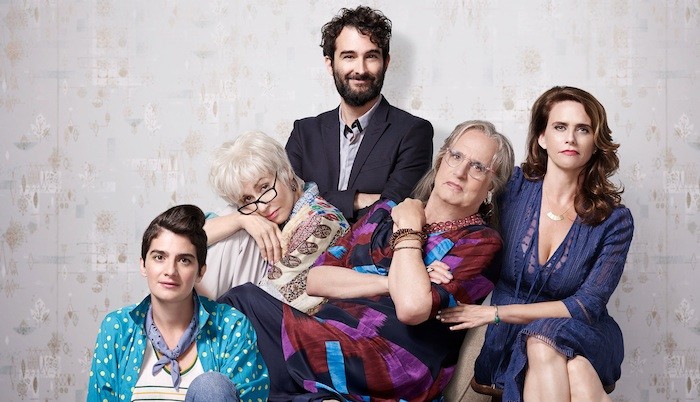Amazon Prime Video TV review: Transparent Season 2 (Episodes 1 to 5)
Review Overview
Cast
10Family
10History
10David Farnor | On 10, Dec 2015
A little over a year ago, Amazon released Transparent, a show about a father who comes out as a mother to his children. We declared it the best TV series of 2014. The Golden Globes agreed with us, making it the first online-only programme to win an award for Best Series. It was a ground-breaking piece of television, both on-screen and off. Now, Transparent returns for a second season. How do you follow up the best show of last year? Get even better.
Jill Soloway’s first season, which saw Jeffrey Tambor’s Maura navigate the initial steps of being a woman, was a provocative, uplifting story about someone accepting who they were. That acceptance had a knock-on effect for the other members of the Pfefferman family, each one starting their own journey of self-discovery. If Season 1’s strength was in the power of the self, though, Season 2 expands Transparent’s scope to explore how people are defined in relation to others.
That group focus is apparent right from the opening shot, which sees the family assemble for a wedding photo – a masterclass in subtle exposition that reminds us what we need to know about each character without spelling it out. There’s perpertually immature Josh (Jay Duplass), who’s trying make good on his commitment to rabbi Raquel (Kathryn Hahn), there’s Maura’s ex, Shelly (Judith Light), still hanging on, and there’s the happy couple: Sarah (Amy Landecker) and Tammy (Melora Hardin). At the centre of it all is Tambor’s calm Moppa of the bride – and on the outskirts is Ali (Gaby Hoffmann), the only one in the family who doesn’t seem to have anyone.
With that improved scale comes an upgraded style, as Soloway’s camera glides through the expensive shindig like a glossy advert: one final tracking shot past bedroom windows captures the family’s myriad personal struggles in one quietly breathtaking, fluid motion. Like Maura, you get the sense that the show’s self-esteem has blossomed: the series feels more confident than ever, in its tone, in its subject and in its presentation.
That becomes most apparent in the flurry of the wedding dancefloor, as an en-masse Hava Nagila cuts around the room, blurred faces, smiling limbs, and coats swinging around people’s heads. A bravura match cut suddenly takes us to Berlin in the 1930s, where we see a similar party unfolding in an equally flamboyant manner. A women in a red cloak catches our eye, spinning and carefree. When we return to the wedding, though, she lingers in the background – a spectre of the past somehow echoed in the present.
It might sound like something out of a horror movie, but Transparent embraces the way that our memories can haunt us years later. Ali, speaking to her girlfriend in a later scene, talks of how residual trauma was found by scientists to be inherited by mice through their genes. Certainly, the importance of heritage and history cannot be overstated for the Pfeffermans. They identify as members of that family – Maura’s first name may have changed, but her surname is resolutely the same – and it’s something that binds them together. They are who they are because of their relatives.
It’s telling, then, that Sarah’s breakdown occurs just as the gang are all together: only at that point, when confronted with Tammy’s entourage, does she have doubts in their marriage. “I don’t even know what I want to do,” she cries, hiding in the toilets, before adding: “I hate her and her stupid family. Those wasps.”
Amy Landecker is superb as Sarah, at once entitled and spoiled yet completely deprived of any certainty. Her face moves from embittered to beaten, snapping at her kids’ teachers one minute and sobbing the next. One sequence involving her at a school disco is laugh-out-loud funny thanks to her amusingly terrible behaviour and the pitiful tragedy of her situation. (The half-hour comedy format for Transparent remains an oddly perfect fit.)
Raquel emerges as the natural confidant for the unhappy bride. She’s a rabbi, she’s about to get hitched herself and she’s always smiling. But Kathryn Hahn – another expert display of gentle sadness – finds her character buckling under the same weight of family legacy. The arrival of Josh’s son, Colton (an entertainignly upbeat Alex MacNicoll) turns their fledgling romance into something far more complex and confused. “I get a Colton, I also get a Rita,” muses Raquel, joining Josh in that limbo of insecurity.
The ensemble is perfectly cast, a fact that we can enjoy as we spend even more time with these supporting characters. They each end up experiencing the same shift that Maura went through in the first season, coming to terms with what their future holds. To do that, though, they must all look behind them, whether that’s Colton and his foster family (who brilliantly refer to Maura as “Josh’s Mee-Maw”) or Amy and her stranded almost-spouse.
“I am your pain,” yells the marvellously belligerent Melora Hardin in a stand-out shouting match – one that occurs, naturally, amid another family gathering.
Soloway’s achievement, as always, is to lead a team of writers and directors (some of them trans) that possesses total empathy for everyone on screen. The result allows us to laugh with and at all of the Pfeffermans in turn, as our sympathies shift and the mood, almost intangibly, alters.
“I love the flavour of lost, lesbian wedding dream cake,” quips one. “Please don’t betray me and tell me it’s a gift,” snipes another. The dialogue is magnificently layered, usually expressing happiness and sadness in a single breath. “I’m sorry if your boundary is my trigger,” argues one. “I don’t know what that means, but ok,” comes the retort. The wit is matched by the visuals, which cut from the joyous blur of a wedding day to a plane overhead advertising WeBuyUgly Houses.com.
Throughout, that indie sensibility remains, the screen given emotional grain by each performer. They’re as comfortable in their own skins as ever, blurting out secrets or hiding back intimate truths with the kind of believability you’re more likely to find in a documentary than a scripted series. The judicious use of music is one of the few reminders that this is fiction. “There’s a new world coming… You can hear it if you try,” calls Nina Simone softly, as Ali curls up with her new partner.
The formation of fresh bonds contrasts with the severing of former flings, a cycle that Transparent circles through with the giddiness of a child on a carousel. This is a place where people don’t just spend years in each other’s company: they promise to “make up life” with each other. Where exes are consequences of actions. Where hopeful proposals can become undermining acts of distrust. Where Sarah, visiting her kids, is “like a ghost” to her once-husband.
And still, 1930s Berlin returns, reminding us that Maura’s exploration of herself is something that has taken place time and time again over the years. Even she finds herself confronted with phantoms of her memory, as an editorial applicant she blocked as a younger professor resurfaces. “I don’t remember,” she says of her conservative days. “Why would you?” his acquaintance replies.
Season 1 was a solo outing that boldly gave centre-stage to a transgender character for the first time on the small screen. It was a landmark piece of television. Season 2, though, confirms Amazon’s Transparent as an equally ground-breaking group production, one that embraces the complexity of past baggage to make sense of present identity. One of the (many) best moments sees Judith Light’s increasingly frail wife sitting on the sofa, only able to choose what Maura wants to watch on TV, rather than what she wants. This is an endlessly nuanced drama that understands family and history are the same thing. The trauma just keeps getting passed down.
All 10 episodes of Transparent Season 2 are available exclusively on Amazon Prime Video UK. Season 1 is already available to stream. Amazon Prime Video costs £5.99 a month – or, for free next-day delivery on products from Amazon as well, £79 a year for a full Amazon Prime membership.
For more on Transparent, see our interview with Jill Soloway and Jeffrey Tambor from last year – or read our reviews of Season 1.





















